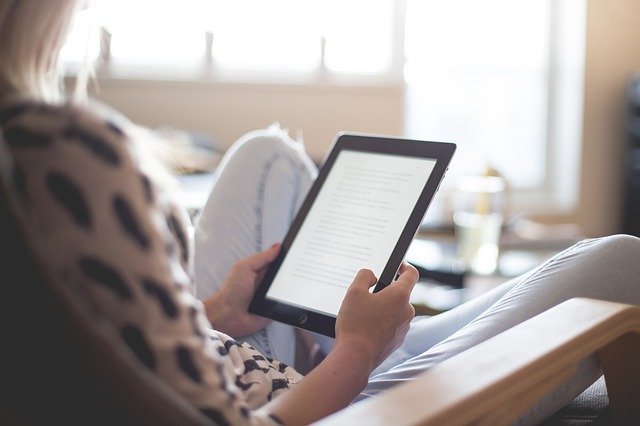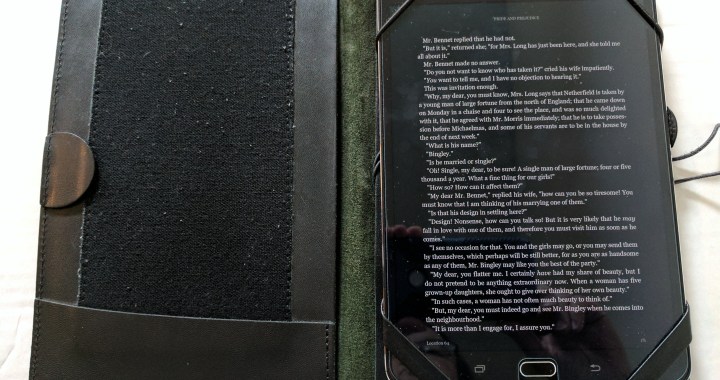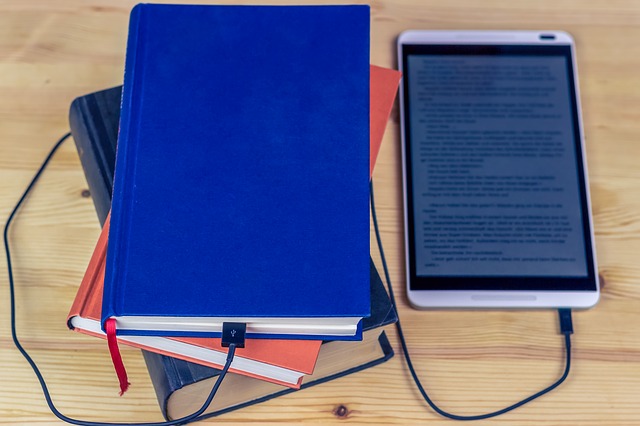I have always read avidly, as much as my time permitted. Libraries are invaluable because I couldn’t afford my reading habit without them.
My husband gave me a Nook Color e-reader for Christmas 2010. I was skeptical when I opened the box. I wasn’t sure I wanted to switch to e-books. But overnight, I was hooked. My reading addiction shifted seamlessly from paper to digital.

Of course, it helped that just as I received my Nook, our local Mid-Continent Public Library made e-books available to their patrons. A whole library at my fingertips! I didn’t even have to drive to the nearest branch.
Since 2010, I’ve gone through three Nooks, and I now use a Samsung tablet for my e-reader. I remain hooked on e-books for most of my reading habit.
Scientific American published an article in 2013, entitled The Reading Brain in the Digital Age: The Science of Paper versus Screens, by Ferris Jabr, that discusses the differences between reading on paper and on screens.
The article begins with a description of a toddler who manipulated a tablet computer with ease, then tried to pinch and swipe the pages of a paper book. I, too, have found myself trying to turn the page of a paper book by tapping the screen, or even tapping a word on the paper page to look up its definition.
The article asks how the technology we use to read changes the way we read, how reading on screens differs from reading paper. Do we read as thoroughly? Do we retain the information as well?
According to Scientific American, the studies that have examined these questions show changing results over time. Before 1992, studies found that people read more slowly on screens; more recent studies have split results.
But many people still report that they miss the feeling of paper in their hands as they read digital books, that they remember less of what they read on screens, and that it takes more mental effort to read e-books.
I was fascinated by the Scientific American article’s description of the neurology of reading. Apparently, we perceive letters as physical objects. We read by weaving together the brain circuits devoted to spoken language, motor coordination, and vision—a relatively new ability in human development.
We also view a page of text as topography, much like we would view a map or a panoramic landscape. Haven’t you found yourself trying to remember how far through a book or where on the page a particular sentence or topic was covered? I always remember the large picture of the spider in Charlotte’s Web, so I know which page to skip when I read that book.
Paper books have more reliable topography than e-books. In digital books the location of text varies as the reader changes font size or style, or from one e-reading device to another (smartphone and tablet, for example).
I also miss knowing instinctively how far I am through a book by the weight of what’s in my left hand and what’s in my right hand. With e-books, I can find out what percentage of the book I’ve read with a simple tap on the screen, but it isn’t the same.
The research also shows that the difference in reading comprehension between what is read on paper and on screen is small, but the difference in retention of the information may be greater. Moreover, knowing and internalizing the information may be easier with paper.
When I want to really learn what I am reading, I prefer hard copy to digital formats. I highlight text when I’m trying to learn the information, and the highlighting function in e-books is not easy to use. The physical and mental sensations of first reading text, then re-reading as I highlight with a neon marker, make it much easier to imprint the information on my brain. I often print out a digital article to highlight when I want to absorb and retain its contents.

I also am more easily distracted when I’m reading on screen than on paper. It’s too easy to switch to another book or surf the web or check email—all these applications and sources are available with a few clicks or taps.
I don’t know whether later generations will learn more easily when they read digitally, or whether e-reading devices will change to better duplicate the tactile experience of reading on paper. For now, I will split my time between paper and screen.
But don’t take my e-reader/tablet away!
I love setting my tablet to night mode and reading in the dark in bed. For novels that are pure escape, where I have no need to retain what I’m reading, it’s a decadent pleasure of the twenty-first century. Of course, it also means I sleep less.
Which do you prefer—reading on paper or on screen?
Theresa is the award-winning author of historical fiction about settling the American West. Before she turned to writing, Theresa was an attorney, mediator, and human resources executive.
Follow Theresa on her website, https://TheresaHuppAuthor.com, or on her Facebook page, https://www.facebook.com/TheresaHuppAuthor.

I prefer paperbacks, but I love my e-reader for travel and poolside reading. And I, too, love the fact that I can easily see how far along I am in a “real” book. Either way, I’ve always got books to read!
And having books to read — in whatever format — is what is most important!